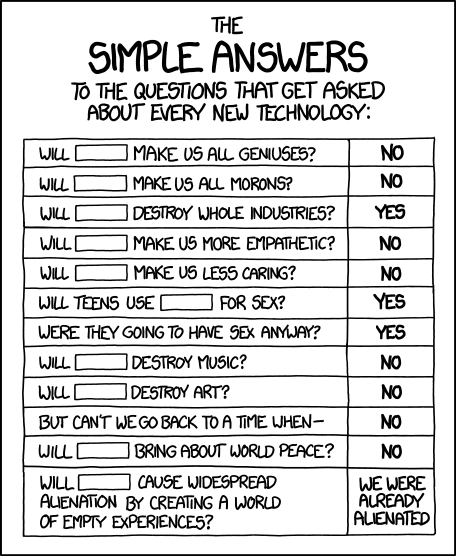TownieDeac
words are futile devices
- Joined
- Mar 16, 2011
- Messages
- 76,189
- Reaction score
- 16,923
Stick with me for a rambling post.
Today at lunch I was talking to my boss about music, and I heard a (common) complaint that music today is terrible, and that growing up in the 1960s and 70s, he was so lucky to have such great music around. I agreed with him in general that the 60s and 70s were a great time for music, but argued that as technology for recording and distribution changed, the quantity grew, and the overall quality of popular music promoted by the same media got worse. He replied that "good music is good music" and that if the music were still as good today, the cream would still rise to the top, and the stuff on the radio would still sound good to him.
Let's put tastes aside for a second, and not argue directly about the quality of music changing and consider a couple other models that technology has distinctly changed.
The shift from print to electronic journalism has been a tough one for most publishers to navigate. As sources of news have skyrocketed, subscriptions have precipitously declined, and the top quality of journalism has distinctly watered down. Sure, there are examples of tremendous amateur bloggers for whom the platform of digital media has provided a much larger audience and a lower barrier to entry than ever before. However, the stability of the niche journalist job has all but disappeared, and the quality of the best works has spread so far and thin amidst all the noise that it's tough to find the best sources anymore.
Again, I don't want to get into the 24 hour news cycle, the quality of networks, or even the quality of certain brands declining with changing consumer tastes. I want to talk primarily about differences in technology of production and distribution methods.
I read recently about a company that seeks to serve a community of fiction readers and writers who haven't found a mass distribution policy via a publisher/promoter/distributor. Again, the barriers for entry into fiction writing have begun to fall as self-publishing has proliferated. The standard production process necessary to take a book through manuscript form into editing, typesetting, printing, and distribution has shortened dramatically with digital publishing. For an author who thinks he has a great book, but can't get it printed, marketed and sold for whatever reason, this business opportunity seems great. Traditional publishers won't be threatened by the grassroots, crowdsourced nature of it because they still own the means of production, so to speak.
My question with all this is whether technology in media is a net good thing. The barriers to entry fall, but the quality of entries on the whole is lowered. It's harder for the cream to rise to the top if the pool is getting larger and larger every day.
Does proliferation of technology contribute to lower quality of writing/music/art?
Today at lunch I was talking to my boss about music, and I heard a (common) complaint that music today is terrible, and that growing up in the 1960s and 70s, he was so lucky to have such great music around. I agreed with him in general that the 60s and 70s were a great time for music, but argued that as technology for recording and distribution changed, the quantity grew, and the overall quality of popular music promoted by the same media got worse. He replied that "good music is good music" and that if the music were still as good today, the cream would still rise to the top, and the stuff on the radio would still sound good to him.
Let's put tastes aside for a second, and not argue directly about the quality of music changing and consider a couple other models that technology has distinctly changed.
The shift from print to electronic journalism has been a tough one for most publishers to navigate. As sources of news have skyrocketed, subscriptions have precipitously declined, and the top quality of journalism has distinctly watered down. Sure, there are examples of tremendous amateur bloggers for whom the platform of digital media has provided a much larger audience and a lower barrier to entry than ever before. However, the stability of the niche journalist job has all but disappeared, and the quality of the best works has spread so far and thin amidst all the noise that it's tough to find the best sources anymore.
Again, I don't want to get into the 24 hour news cycle, the quality of networks, or even the quality of certain brands declining with changing consumer tastes. I want to talk primarily about differences in technology of production and distribution methods.
I read recently about a company that seeks to serve a community of fiction readers and writers who haven't found a mass distribution policy via a publisher/promoter/distributor. Again, the barriers for entry into fiction writing have begun to fall as self-publishing has proliferated. The standard production process necessary to take a book through manuscript form into editing, typesetting, printing, and distribution has shortened dramatically with digital publishing. For an author who thinks he has a great book, but can't get it printed, marketed and sold for whatever reason, this business opportunity seems great. Traditional publishers won't be threatened by the grassroots, crowdsourced nature of it because they still own the means of production, so to speak.
My question with all this is whether technology in media is a net good thing. The barriers to entry fall, but the quality of entries on the whole is lowered. It's harder for the cream to rise to the top if the pool is getting larger and larger every day.
Does proliferation of technology contribute to lower quality of writing/music/art?


